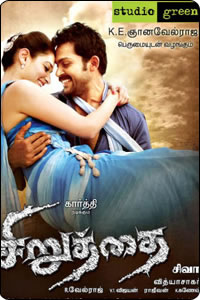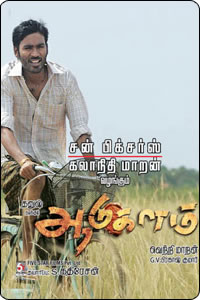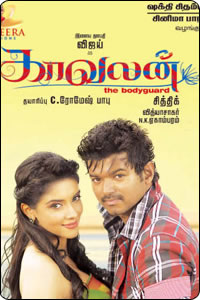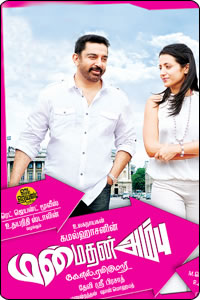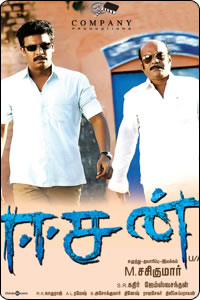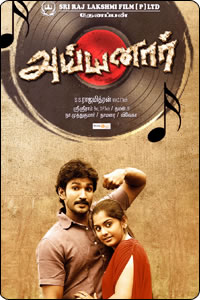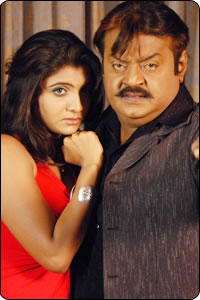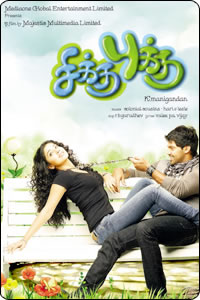| |||||||||
immediately love at first sight for Karthi. Despite his dubious credentials, he perjures himself as being a software engineer to win the rich Tamannah’s love. His life is further complicated when one of his thieving expeditions make him bring home a child. The girl child identifies him as her father and there begins a string of events; Karthi is being mysteriously chased by blood thirsty, burly goons after the child’s arrival. Tamannah breaks up with him after the child’s entry thinking he lied to her about the child. As one can see, the movie has enough potential to be presented as a no-holds-barred entertainer. Instead, the director borrows the Telugu version’s garishness and manages only to translate (sometimes even transliterate) the dialogues and comes up with a banal stereotype of a movie. To muffle the questions that would arise out of the language that is being used, the director inserts a disclaimer at the opening of the movie stating that it’s for the benefit of the viewers that every character speaks Tamil although most of the proceedings happen in Andhra Pradesh. But he conveniently forgets the other questions that would arise out of unreasonable sequences that fill the movie. Those might never be answered. Karthi’s smile is his asset but in a movie that has little scope for such endearments, his qualities are of little help. There is one scene that pronounces his versatility. He gets annoyed and smashes the little girl’s walkman without knowing how precious that is for her. And he melts down immediately after revelation, embracing the child and cocooning her with his fatherly love. The last scenes, in which the character Rocket Raja dons the cop uniform, are also a riot. The actor pulling off two diverse roles with consummate ease is the saving grace of the movie. Since the originality of the Telugu version is retained, when released in Andhra this movie might serve as Karthi’s launch pad in Tollywood. In the little time he’s allowed to be on screen, Santhanam manages to break the movie hall into laughter with his wisecracks. Karthi and Santhanam complement each other as well. Tamannah is just another pretty face in the movie and has absolutely nothing to do other than look pretty and dance gracefully. She also seems to be willing enough to flaunt her navel area, much to the delight of Karthi and her fans. Which brings us to the songs; all of them seem to follow the same beat and are equally humdrum. The movie is also riddled with crude dialogues; it would still have been tolerable if they were used only for comedy, but in the name of villainy the movie throws in some cringe-worthy dialogues and scenes that are sure to make the women in your family squirm in their seats. Ganesh’s stunts are old-schoolish. Sample this: Karthi leaps out of a 10 storeyed under-construction building and lands in his two (feet). And we said it’s only a sample. Despite this, Velraj’s cinematography manages to tone down the movie’s violence with its subtlety (a quality that is otherwise non-existent in the movie). Watch Siruthai if you are a hardcore mass masala fan. Chances are that you might like Karthi, who is trying his best to prevent the movie from its impending dive into the depths of hackneyed void. Verdict: Another mass masala remake! | |||||||||
| |||||||||
Resorting to rural milieu is not something uncommon in Tamil cinema but the director has justified the usage of his premise ably. Having said that, he has employed myriad human emotions like unquestionable trust and the breach of it, loyalty, pain, anguish, manipulation and remorse to convey his tale. Rearing roosters, maintaining them and using them for fights are a way of life and a matter of honor and lifeline to many people. In such a tenement, Pettaikaarar (Jayabalan) leads a very respectable life with his key aides Durai (Kishore) and Karuppu (Dhanush) along with others. His main adversary in hen fights is Rathinam, the police inspector. Pettaikaarar is known to have an impeccable track record of successes when it comes to fowl fights especially with Rathinam’s. In an unexpected situation, Pettaikaarar challenges Rathinam to a fowl contest which witnesses Karuppu violating his mentor Pettaikaarar’s word but emerging successfully with enviable proceeds. This results in the swelling of his status among his folks which plants the seeds of animosity in the minds of Pettaikaarar. Rest of Aadukalam travels on an unexpected path with twists and turns highlighting on the way the multiple layers of human emotions with sense playing truant. The major plus point of Aadukalam is its strength in characterization. Nowhere in the film will you find the characters oscillating. Vetrimaaran proves that he is after all an adept raconteur with an eye for details. Every scene substantiates his efforts. The amount of detailing especially pertaining to the roosters needs plaudits which incidentally justifies the long period in making. It will be an understatement to say Dhanush steals the show as the actor has lived the role of Karuppu. What a multitude of expressions in a single twitch of muscle or in a raised eyebrow? It is a visual treat to watch this talented lad perform be it the love that he feels towards Tapasee or the rambunctious jive he breaks into when she declares her love for him or the pain he feels when Jayabalan treats him badly or his regret when he loses his mom or the anguish on discovering betrayal. Dhanush is a revelation and makes you wonder if anyone else could have done justice to this role. Jayabalan, the Tamil poet as the Pettaikaarar delivers an effective portrayal. With the right kind of expressions and body language, he demonstrates a new type of villainy and Radha Ravi’s voice adds strength to his role. Tapasee Pannu as the Anglo Indian girl Irene is adequate and portrays her role in a respect worthy fashion. Kishore as Durai with Samudirakkani’s voice is valuable. Besides these, there are many small characters that make their mark like the Pettaikaarar’s young wife, Karuppu’s friend and so on. G V Prakash’s music elevates Aadukalam and intensifies the effect over the audience. Songs are rightly placed and none of them are contrived. While Otha sollaale makes the audience boogie, Ayyayo and Yathe Yathe’s melody enthrals them. His BGM during the pre-interval rooster fight slowly reaching the crescendo adds up to the suspense quotient and the spiralling frenzy. The action sequence especially in the climax is realistic and credible. Velraj’s camera travels to nook and corner of Madurai areas and sucks in the audience to the film. On the flipside, the film is a tad lengthy in the first half and there are patches of slowness but they are few and far between. It is evident that the director has resorted to graphics for rooster fights to abide by the rules of animal welfare board. In all, Aadukalam is an attempt that requires appreciation where the director has hackled his way through the path less trodden with aplomb. Aadukalam reiterates that Vetrimaaran belongs to the league of film makers who has understood the semiotics of film making perfectly. Verdict: A winning rooster! | |||||||||
| |||||||||
Kavalan , remake of the Malayalam film Bodyguard, brings together the successful duo of Vijay and Siddique once again, not to mention the hit Vijay-Asin combination. Coming from Siddique, the man who gave us Friends, the expectations is of a Vijay starrer that would be rather different from the ones we have been offered lately. Kavalan is an emotionally narrated love story about a righteous and innocent man who is assigned the task of being a young woman’s bodyguard. He puts full faith and confidence in anything that he does; his love story too blossoms because of these qualities. But, unwittingly, the faith that he shows is taken advantage of in a way that no one would imagine. It is not with malice or any villainy that this is done; but out of love and admiration towards such an innocent person. It is love and destiny that play hero and villain in this story of relationships. The movie also subtly tells us that it is never good to leave things untold for too long in love. Kavalan is redemption of sorts for Vijay – the actor. For the past couple of years or more, a lot of Tamil movie buffs have watched in dismay as he slipped further and further into a quagmire of senseless commercialism; sometimes not keeping up with the trend of change in the industry. But, Kavalan is a reminder to all of us, most importantly to many directors in the industry, that he can act; not just as the ‘savior hero’ or messiah of the masses, but as a person who feels love, happiness, sorrow and all other emotions. For the first time in a few years, a Vijay film is not only about its hero, but about the characters and relationships. That is about Kavalan with respect to Vijay. But, how has the film shaped up otherwise? Its a fairly engaging, relatable, simple and sweet story of love which has an unexpected twist and an emotionally charged climax. Nothing that goes remotely close to commercial formulae, has been added here; which does not mean that this is an offbeat or art-house film. It is an entertainer all right; but one which looks to engage you more through the interplay of characters rather than grandeur. Shot and narrated with simplicity, it leaves you with a warm feeling in the heart because the director makes you empathize with the characters. At no point does the consistency of characterization get abandoned in an attempt to provide a few extra laughs or thrills. Fights, a couple, look every bit reasonable and comedy handled by Vadivelu and Vijay, puts a smile on your face but fails to make you burst out with laughter. On the flipside, the length of the film might work against it. It starts and keeps moving at a consistent pace (generally considered slow on the commercial scale) and never really accelerates. The final hour in particular would have looked much crisper with a bit of trimming. Even with very well conceived emotional scenes well enacted by the cast, one does feel a bit tired. A couple of songs towards the end too could have been better placed or even avoided. This is a script which gives actors a lot of room to emote. Vijay has grabbed the chance with both hands. One wonders if it was his decision to stay away from ‘down to earth’ characters all these years, or the compulsions from a commercially driven industry. Kavalan is a throwback to the ‘Thulladha Manamum Thullum’ days of Vijay and we hope the days are here to stay. He has lived the character. Asin, in Tamil for the first time after Dasavatharam, convinces us with her portrayal. The chemistry of the lead pair has worked out well; especially the portions where Asin tries various ways to exasperate Vijay; things that ultimately result in love. Vadivelu evokes smiles and the occasional laugh. The rest of the cast including the experienced Raj Kiran and Roja add weight to the movie. Camera, editing and all technical departments have adhered strictly to the requirements of the movie. Two compositions of Vidhyasagar make you hum along. Director Siddique shows excellent command over proceedings right through the movie. Overall, Kavalan is a movie that defies all the preset notions of a Vijay starrer that have been built over the last couple of years. It is his return to the romantic hero mould and also a call to all directors of the industry to stop pre-meditating ‘over the top’ scripts for him. A relatable love story shot in a cute and simple manner, rich with emotions, but on the slow side of narration. Yes, there is nothing special, but nothing to grumble about either! Verdict: Vijay (re)turns romantic! Feel good – Feel emotional! | |||||||||
| |||||||||
Ambu produced under the Red Giant banner of Udayanidhi Stalin. Adhering to the title in its literal sense, love and cupid form the peripheral element while faith and honesty are the core constituents which have been dealt in a light manner. Ambujakshi (Trisha) is an actress whose fiancé is industrialist Madana Gopal (Madhavan). Trisha’s profession comes in the way of her impending marriage to Maddy and after a rift between the two, she takes a break from her career on a European cruise with her friend Deepa (Sangeetha) who is a divorcee with 2 kids. On the other hand, Maddy sends Mannar (Kamal), an ex-army man to spy Trisha’s movements. Kamal takes on this job to meet the medical expenses of his friend (Ramesh Aravind), a cancer patient. What happens in this cruise, whether Trisha and Maddy resolve their differences of opinion and what happens to Kamal is what Manmadhan Ambu all about. K S Ravikumar who understands the semiotics of film making has attempted to narrate the story in his style but its languorous pace works against it. Although the story is interesting, the film unfolds very slowly and does not gather momentum at any stage. The script sparkles in patches and fails to engage the audience completely. Dialogues are enjoyable in some places like the scene where Sangeetha says – matrimony may not be good but alimony is. The way in which Kamal narrates his past in a reverse mode is intelligent. There are no words to talk about Kamal who has completed half a ton years of diligence in the world of greasepaint and glory. He wafts through the proceedings seamlessly. Sangeetha overshadows all the other artists in her natural and spontaneous performance. Trisha for the first time in her career speaks for herself and it is a revelation and certainly adds greater strength to her character. Hope she continues this exercise in the future too. Madhavan teams up with Kamal after Anbe Sivam and is his ‘spirited’ self mostly. His debonair and suave looks in the initial scene accompanied by the right kind of body language for a rich industrialist fits the proceedings aptly. Suriya in a small cameo as Trisha’s co-star in her film is adorable. In their small roles Oorvasi and Ramesh Aravind bring out the agony of illness. In fact, the performance of the cast compensates for the languid narration. Under music director Devi Sri Prasad’s compositions, Oyyale stays in mind and the other numbers are just about satisfactory. Cinematographer Manushya Nandan adds value to the film. Gauthami’s stylish costumes work right for the script. Overall, Manmadhan Ambu is an entertainer but in parts. Verdict: A passable cruise! | |||||||||
| |||||||||
very definitely bucolic and Sasikumar’s gimlet-eyed exploration of the subject warrants a special mention. Chezhian (Vaibhav) is the son of politician Deivanayagam (AL Azhagappan) and is exactly like one speckled with vices. He falls in love with Reshma (Aparna), the daughter of a business tycoon from Karnataka. Deivanayagam agrees to this match with an ulterior motive and that’s when Chezhian goes missing. The trail to Chezhian is what Easan is all about that has been narrated in a riveting manner in the second half. The film opens with ‘Inda Iravu Daan Pogude’ number (nicely done) which is followed by the chase of a lone girl in a two-wheeler by a group of drunken boys in the middle of the night which leads to her death. The story further unfurls with the boys being taken into custody by the police and Vaibhav aiding them with a helpless ACP Sangaiya (Samudirakani) as a mute spectator. Further on, the film moves with the various power games played by the politicians, bureaucrats and businessmen dotted with the pubs of city life, rave parties and hookah joints. Sasikumar also throws in the frolic of lower strata with the ‘jilla vittu jilla’ number. The tight grip that Sasikumar has on his audience for the first few minutes slackens slowly and the rest of the 1st half is filled with events and characters that leave you with wonder as to what the director wants to convey. Sasi has you in perplexity as to what the genre of the film is going to be - whether it is a political battle or a societal theme. The slow and ambiguous narration also tests the endurance levels of the audience. However, he makes up for all these in the second half where the film picks up momentum and zooms through with an intense climax. The specialty about Easan is there is no hero, there is no heroine or for that matter there is not a single character that monopolizes the screen. And more so, there is a surprise package in the identity of Easan which is new to Tamil cinema. There are some appealing twists and there is an interesting aspect of cyber hacking too. All the characters have done their part with good understanding. Samudirakani, Azhagappan, Namo Narayana and Blessy stand out and there is not much to explore for Vaibhav and Abhinaya. Wonder what the director has against Silambarasan to show a character and a voice like him in the pub with a heroine in hand. The Jilla Vittu number is an unnecessary intrusion and does not help the film in anyway except to give the audience their break. The first half, barring the first few minutes, is a non-linear presentation. On the technical side, cameraman Kadhir, editor Ramesh, music director James Vasanthan have worked in tandem with the film. Through Easan, Sasikumar has attempted to convey the dangers of city life when not dealt with carefully and it could also ring in a warning to people who take things lightly. For those who feel the anachronism in rape followed by suicide, the director has given his answer through the origin of his characters. If Sasi has pruned some of the sequences, Easan would have been a riveting offering. Verdict: An urban dark tale | |||||||||
| |||||||||
dead brother Saravanan (Vishnu Priyan) and mimicking as him over the phone to his mother. Cut to flashback of 2 years time, the film is set in backdrops of Kumbakonam depicting Prabhakar as a devil-may-care lad. Younger brother Saravanan, the breadwinner of the family happens to be his only envy as his family members pamper him. This incisively leads to a blind assumption behind the shocking act of Prabhakar. But the tale proceeds in unexpected paths with an incredulous suspense unraveled at climax. Filmmaker Raja Mithran has composed a family drama that involves the projection of egoistic problems persisting between siblings. Similarly, the behavioral attitude of family members of how they treat them with their own accordance is also portrayed. The cryptic 15 minutes prologue appears effective. But in later point of time, the screenplay goes disoriented as audiences fail to differentiate between the present and flashback sequences with realms of many illogical elements. It looks like Aadhi purposely opted to jump into the shoes of mass-hero. Unlike his previous flicks, Ayyanar tries to depict him in a larger-than-life role, where he chews beedas, smashes down dozen of roughnecks at the same time and gets into dream sequences for duets with Meera Nandan. Heroine Meera Nandan’s role is restricted to same degrees of what other heroines get to play in usual commercial potboilers. A big disappointment for Santhanam fans as the actor doesn’t appear more than a couple of scenes. Having promoted the film with his solo images with looks of Osama Bin Laden, it turns out to be a letdown for them. Jayaprakash sleepwalks through the role of a strict father. Director Raja Mithran fails to focus upon certain things, which happens to be a blatant flaw in the tale. The basic confusions break open with the protagonist’s decision of hiding the death of his brother. His reasoning remains unjustified even after the show. If the filmmaker had scrupulously concentrated in these areas, it would have been better. The scene involving Aadhi’s escape from a bunch of policemen surrounding him is exceptionally displeasing. How could the director conceptualize such an amateurish sequencing? The complete drama of police investigation acts as a spoiler. Thaman limits himself to the same pattern as the songs remind you of some of his other albums. The title song ‘Kuthu Kuthu’ with the wild choreography is a special treat for the masses and ‘Pacchai Kili’ is a dulcet melody well picturized by cinematographer Sethu Sriram. Ayyanar stands in the passable league that can gratify the audiences, who are least, bothered about logics. Verdict: An average show by first-timer. | |||||||||
| |||||||||
the protagonists combating against bad politicians for society’s well being. On the contrary, ‘Virudhagiri’ proves to be different by touching upon some of the important issues. Vijayakanth delivers with his directorial touch for adding some essential ingredients in narration. The film is based on Liam Neeson starrer Hollywood movie ‘Taken’, an emotional thriller indeed. However, Captain’s idea linking the Australian attack on Indian students with this plot makes it interesting. Virudhagiri (Vijayakanth), a sincere police officer endeavors in safeguarding the societal peace. Gaining international recognition for accomplishing a security task in foreign countries, he returns to Chennai handling a serious case of transgenders being scourged to death for organ racketing. On an unexpected turn, his niece (Madhuri Idaki) undertakes a trip to Australia, where she gets kidnapped by a group of strangers. Using his high-skilled intelligence activities, Virudhagiri flies down to the foreign land for the rescue. Vijayakanth outlines whole lot of hard-hitting problems through dialogues that often wins applause from his audience, which includes the present film industry related issues of piracies... One such example is when Mansoor Ali Khan says “Avanga vaarisu edukuru pandanga mattum marketla varavae varadhu. Matthavan padam release aana anikke vandhududhu”. The title song ‘Makkal Oru Puram’ distinctly speaks off the actor’s expression on present-age political system. Implying the importance of Tamilians and their accomplishments in various arenas across the globe easily gains the attention of audiences. Vijayakanth deserves special pat for not being enslaved to clichés like heroines falling in love with him and dancing duet numbers. The actor thereby strides on a clear route and avoids such unwanted ingredients, which otherwise would have been a spoiler. But on the flipside with other characters in the film relentlessly praising the protagonist, it evokes delight only amongst his fans, while for others it may turn an ordeal. The self-aggrandizing liners penned by Vijayakanth go limitless after a certain extent, which should have been avoided. He goes irresistible over-singing self-praises to the baddies in foreigners. The screen play sometimes appears disconnected. The picturizing of trigger-violent sequences of gruesome massacre of transgenders could have been softened as it creates aversion. Boopathy should have handled these shots in a moderate way while his creative placement of lens in few places, especially the action sequences is appreciable. Sundar C Babu’s title song ‘Yezhaigal Thozha Vaa Va’ is a pure political propaganda while ‘Makkal Oru Puram’ goes in right tunes. The motive of Vijayakanth is very clear. He has used Virudhagiri as a communication vehicle to convey his thoughts at the same time satisfying the entertainment quotient to the audience. If you go with an unbiased notion, the film may appeal to you. For the hard core Vijaykanth fans, Virudhagiri is a treat! Verdict: Captain’s self-promotion | |||||||||
| |||||||||
slightly touches this line, but takes a different route in its narrative style. Chikku Bukku is a high-fashioned flick with luxurious realms of technical aspects and boasts of some good performances by actors as well. The tale of Chikku Bukku cuts itself into two different eras – 1985 and 2010. Set in backdrops of 1985, Sekar (Arya) is found penning his beautiful memories of love with Meenal (Preetika) in a diary. Within fraction of seconds we are shifted to present epoch of 2010 in London. Arjun (again played by Arya), a peppy DJ flying back to his hometown Karaikudi to settle down property disputes. Flamboyantly cheerful Anu (Shriya Saran) is heading back to Madurai for meeting her dad. Unexpected situations bring Arjun and Anu together as they end up traveling together in a train with wrong identity in tickets. Caught red-handed for their conniving act, they are marooned halfway in a desolate station. Here begins the idyllic travel of these young vibrant couple as we commute through different ages of love. Manikandan is vividly influenced by his mentor late director Jeeva’s insatiable passion for rich colorful visuals and locations. You’ll experience the paradise right before your eyes with Gurudev’s spellbinding embellishment of visuals across scenic locales of London, Chikmagalore, Coorg and Karaikudi. On the dot, if there is one perfect reason to get you intact with the show, the brilliant visuals stand out as a substantial ingredient. On the performance level, Arya looks energetic, confident and his delineation as Sekar is effective. Watch out for his dance in title song ‘Chikku Bukku’. Shriya Saran, apart from looking ravishing, strides effortlessly, emoting to what is required. Manigandan deserves appreciation for her portrayal that breaks the clichés in many aspects. Newcomer Preetika impresses with her exquisitely graceful looks. She grabs our attention through her innocuous nature, particularly with the scenes involving the school inspection. The complete drama involving Arya, Preetika and school kids tickles the funny bones. Santhanam doesn’t get much prominence and has very little scope to amuse us. Anup Kumar takes on his role with decent approach and flawless acting. Filmmaker’s predilection towards technical arenas can be witnessed in every frame. Colonial Cousins sway to their best in every song. Specifically, the title song Chikku Bukku’ and Zara Zara stand out. Choreographers deserve special praise and so does the costume designers. Praveen Mani’s background score could have been better. V.T. Vijayan disappoints with loads of discontinuities between the shots. A smooth transition between the shots would have helped for better output. Sluggish screenplay turns out to be one of the blatant minuses of this film. What should have been a gripping tale of romance loses its pace halfway. The conflicts aren’t established properly. The main drawback of the film is the narrative imbalance. The flashback sequences are narrated through the lead characters’ glimpses on diary. But the lack of continuity during second hour trivializes the intensity. The term Chikku Bukku is often related with the slow-paced steam engine trains. In all likelihood, the film often becomes slow-paced and director Manikandan could have literally focalized into this attribute diminishing certain illogical traits. Verdict: Passable journey with few breakdowns | |||||||||

